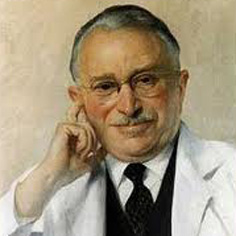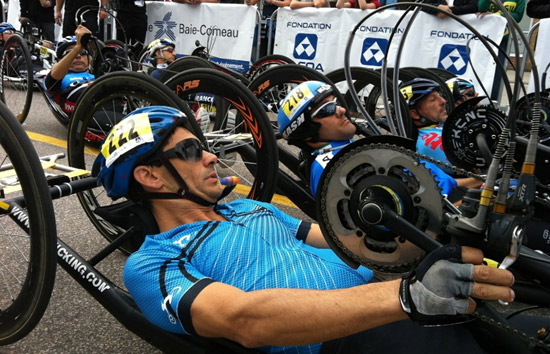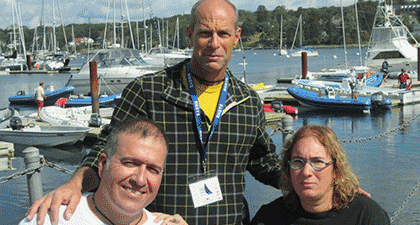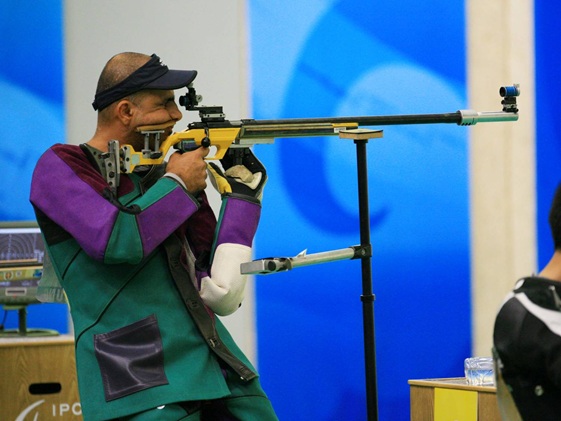The Rio Olympics may be history but the Games are about to begin. The Paralympic Games. Thousands of top athletes with disabilities from approximately 175 countries will compete in 23 sports in Rio. Today, a look at Israel’s record at the Games, some athletes to watch and the story of the man behind the Paralympics.
 The idea for creating these Games goes to Sir Ludwig Guttmann. Guttmann, a Jew, was a neurosurgeon in Breslau before fleeing to England in 1939. He came up with the idea for the Games while working at the National Spinal Injuries Centre at Stoke Mandeville near London. “By instilling self-respect, self-discipline, a competitive spirit, and comradeship,” Guttmann said, “sport develops mental attitudes that are essential for social reintegration.”
The idea for creating these Games goes to Sir Ludwig Guttmann. Guttmann, a Jew, was a neurosurgeon in Breslau before fleeing to England in 1939. He came up with the idea for the Games while working at the National Spinal Injuries Centre at Stoke Mandeville near London. “By instilling self-respect, self-discipline, a competitive spirit, and comradeship,” Guttmann said, “sport develops mental attitudes that are essential for social reintegration.”
Guttmann’s first Games in 1948 were modest by any standards. They took place on hospital grounds and consisted of one sport: archery – eight wheelchair archers from Stoke Mandeville and eight opponents. In 1960, they were renamed the Paralympics and were hosted by Rome following that year’s Summer Olympics.

The third Games were slated to take place in 1968 in Mexico City, once again after the Summer Olympics. But two years earlier, Mexico said it would not be able to host the Paralympics for technical reasons. Israel stepped up and offered Tel Aviv as the host city, an offer that Sir Ludwig accepted. In 1968, Tel Aviv welcomed 750 athletes from 29 countries participating in sports including basketball, dart archery, fencing, lawn bowls, snooker, swimming, table tennis and weightlifting.
While it took 52 years of competition for Israel to score its first Olympic gold at Athens in 2004, the country has garnered 124 golds and a total of 380 medals at the Paralympics. It should be noted that in recent years, global athletic competition has stiffened and Israel’s Paralympic haul has declined.
Going through the website of the Israeli Paralympics Committee is a sobering experience. The site points out that roughly 10 per cent of the country’s population suffer from physical disabilities. “These horrifying numbers have always attested to three main factors: wars, road accidents and crippling maladies from birth.” At the same time, the team of disabled athletes has “brought a bright ray of hope, both to our beleaguered state and to those among its faithful countrymen who have paid the horrific price.”
This year, Israel is sending a delegation of 30 to Rio to compete in 11 sports categories including swimming, cycling, boccia, wheelchair tennis and marathon (blind). Here are four of those athletes.
At the age of 17, Pascale Bercovitch lost both of her legs in a train accident in her native France. After making aliyah, Bercovitch went on to be a volunteer in the Israeli army, a film director, a journalist and a mother of two. And she’s about to become the first person to compete in three Paralympics in three different sports – rowing in Beijing in 2008, hand cycling in London in 2012, and now kayaking in Rio. Because she’s new to this sport, Bercovitch doesn’t think she’ll bring home a medal… yet. The 49-old old athlete is looking forward to Tokyo 2020 for that!

Husband and wife Moshe and Hagar Zehavi will compete in the two-person SKUD racing sailboat in Rio. Moshe contracted polio as an infant and is in a wheelchair. He finished fifth at the 2010 Worlds. Hagar became a paraplegic in a car accident in 1990. She played wheelchair basketball on Israel’s national team but answered the call when the sailing team needed a female member. What’s it like competing as a team? “Sometimes we shout, but we always seem to get to shore safely,” Moshe told The Canadian Jewish News in 2014. Adds Hagar, “I’m the captain on the boat. Moshe says ‘Yes, dear!’”

In 1987, Doron Shaziri was serving in the IDF’s Golani Brigade in Lebanon. When two fellow soldiers wandered into a minefield, Shaziri went to help them. He stepped on a mine and lost his left leg. Shaziri has gone on to compete in rifle shooting at five Paralympic Games – Rio will be his sixth – and has an assortment of bronze and silver medals. “I’m always smiling,” he told thejc.com in 2012. “You must take sport in the correct proportion… There are ups, and there are downs. The main thing is to concentrate on the present moment. There is no point in thinking about what just finished. Move on. I’m always concentrating for the next competition.”
Rowing coach Alexander Skoblo probably understands what makes these athletes tick better than anybody else. “It’s not connected to the body, it’s connected to the mind. For every athlete, it doesn’t matter if they are disabled or not. If they have a weak mind, there is nothing to discuss, they can’t be athletes.”
https://www.youtube.com/watch?v=-W5NsBpMWi8






